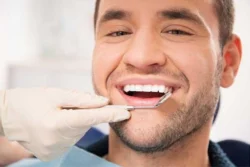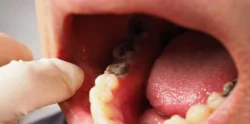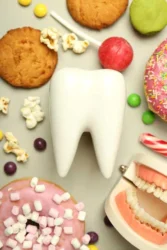Cavities result from tooth decay and are common dental issues affecting children and adults. However, children and toddlers are at higher risk, mainly because they cannot independently take proper care of their oral health. Another primary reason is ignorance. Many people overlook their children’s teeth, thinking it wouldn’t matter.
However, cavities can cause several dental problems if left untreated. This article discusses the causes of cavities in children, how to prevent cavities in children, and the available treatment options.
Highlights
Causes of Cavities In Children
Cavities in children are primarily a result of built-up bacteria, saliva, and sugary foods. Since children love sugary foods, they become more prone to cavities. Although every child is prone to having cavities, it is riskier in some children than in others. The following are the common causes of cavities in children and toddlers:
– Children are unable to brush and floss their teeth effectively.
To prevent cavities, brushing at least twice daily and flossing are essential. However, most kids don’t find brushing and flossing their teeth a fun activity; hence they need the encouragement and supervision of their parents to do it properly. To encourage them, you can play exciting music for about two minutes while they brush their teeth.
– Children have misaligned or crooked teeth.
Misaligned teeth are caused in children due to childhood habits like thumb sucking. As a result, the upper and lower teeth are not well aligned. As the child grows adult teeth, the teeth become overcrowded and more challenging to clean with brushing and flossing alone. This stage may result in tooth decay and cavity if proper orthodontic care is not sought.
– Children make a bad choice of foods.
It is not surprising that children love sweets, chocolates, and all sugary foods. However, bacteria grow as they feed on sugary foods. Hence, when sugary foods are consumed frequently, they lead to cavities. Since children can’t help but consume sugary foods, it is the role of their parents to ensure that they make the right choice of foods.
– Children sleep with their feeding bottles.
Many children are in the habit of sleeping with their bottles. However, the natural bacteria in their mouth convert the sugary items on the bottle into acids. The effect worsens during sleep because saliva flow is reduced at that time. Parents must ensure that their children sleep without feeding bottles; otherwise, they risk cavities.
Symptoms of Cavities In Children
The symptoms of cavities may differ for each child. In fact, some children may not have symptoms; this is why it is essential to have a regular schedule with a good dentist. However, here are some of the common symptoms of cavities in children:
– Stains on the teeth
Initially, the stain may appear as a white spot, but with time, the white spot turns dark. These stains vary in color and can be different for each child. If left untreated, the stains leave the tooth surface and go deep into the tooth’s root. If left untreated, it causes pain in the mouth.
– Sensitivity to hot, cold, and sugary foods
Another major thing to look out for in children is their sensitivity to hot, cold, and sugary foods. As a result of cavities, children react to such foods. The presence of a cavity eradicates the enamel and makes the dentin open to attacks. At this stage, when sugary, hot, or foods are consumed, they overstimulate the nerves and cause pain.
– Hole in the tooth
Untreated cavities often worsen to a hole in the tooth. You can notice the holes in between your child’s teeth or in more subtle places such as their crevices. Tooth hole causes severe pain and can’t heal on their own. Therefore, it is crucial to visit an orthodontist for immediate treatment.
– Toothache
Toothache is one of the most prominent symptoms of a toothache. When your child complains of a toothache, it may signify that the cavity is getting worse and needs immediate attention. Sometimes, toothache occurs without prior symptoms like white spots on the teeth. However, a regular dental check-up can create awareness and lead to early treatment.
How To Treat Cavities In Children
The aim of treating cavities in children is to prevent the condition from worsening. The Orthodontist will prescribe a treatment plan for your child depending on the symptoms, age, overall health, and severity of the cavity. Common treatment plans are discussed below:
– Fluoride varnish
For mild conditions of cavities, your Orthodontist may recommend professional fluoride treatments. This involves using concentrated fluoride solution to repair the enamel and stop further decay.
– Dental filling
A dental filling is mainly recommended for typical cases of cavities. At this stage, there is a hole in the tooth. The hole is then filled with a small drill filled with composite, gold, or silver amalgam to protect the tooth from further decay.
– Dental crown
A dental crown may be an option if the cavity has become more severe. In this case, a dental crown replaces the decayed part of the tooth and acts as a covering for the remaining parts.
– Root canal
A root canal is usually carried out on children above the age of twelve. However, it can be done for younger children if the cavity has gone deep into the tooth nerve. The procedure eliminates the affected pulp in the child’s teeth.
– Tooth extraction
Your dentist may recommend tooth extraction for extreme cases of the cavity. At this stage, the tooth has developed an abscess, and the cavity has become large. Therefore, dental fillings or crowns are not suitable options.
How To Prevent Cavities In Children
Although cavities are common in children, they can be prevented with the right prevention tips. Taking preventive measures helps to protect your child’s self-esteem at an early age. The following tips can help to prevent cavities in your child:
- Monitor their diet and encourage them to consume the right food in the correct quantity.
- Supervise them as they brush their teeth and teach them the right way to floss their teeth.
By scheduling regular appointments with a professional orthodontist, you can detect cavities early in your child and save yourself and your child unnecessary stress. As a result, you get to protect your child’s smile and self-esteem.







